window JEEP GRAND CHEROKEE 2017 WK2 / 4.G User Guide
[x] Cancel search | Manufacturer: JEEP, Model Year: 2017, Model line: GRAND CHEROKEE, Model: JEEP GRAND CHEROKEE 2017 WK2 / 4.GPages: 372
Page 11 of 372
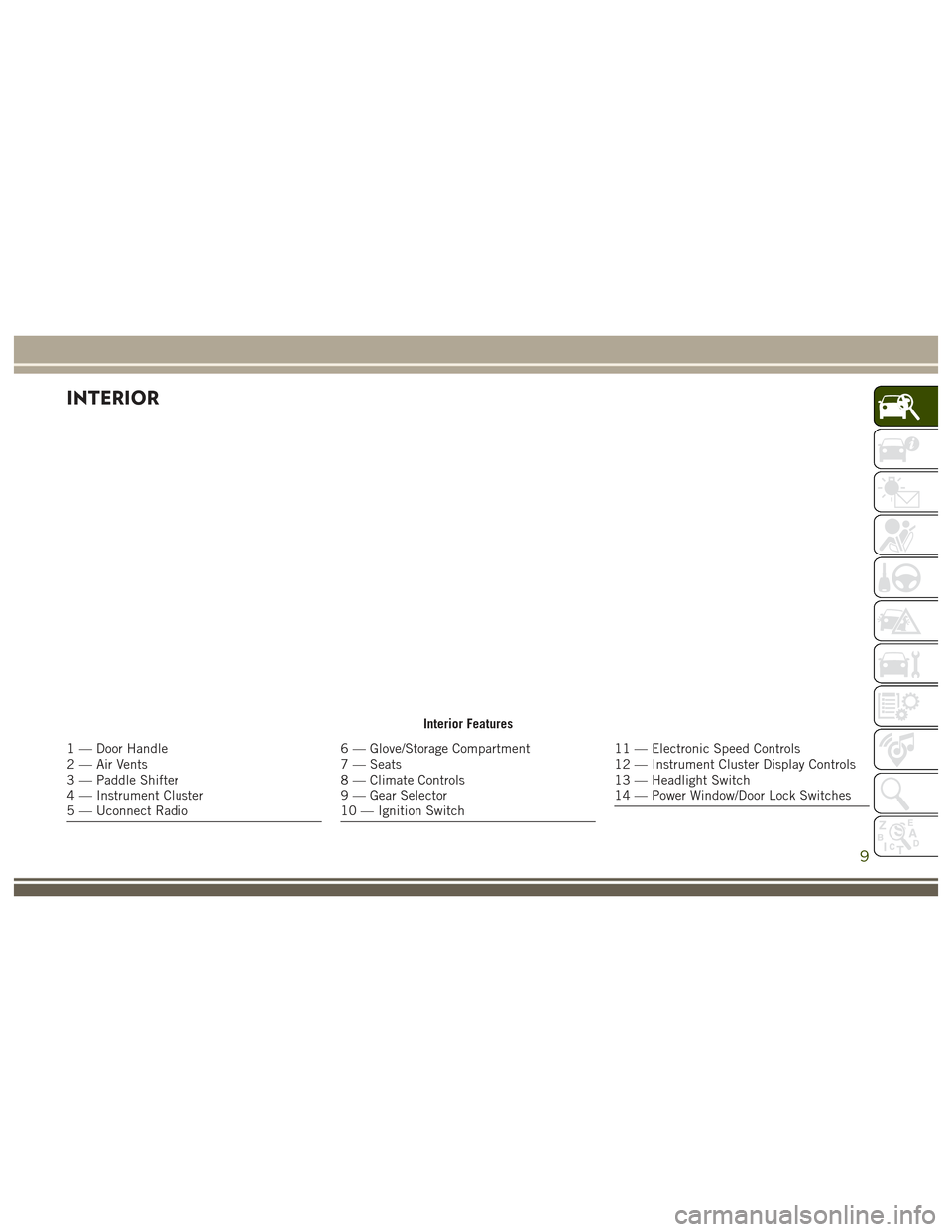
INTERIOR
Interior Features
1 — Door Handle
2 — Air Vents
3 — Paddle Shifter
4 — Instrument Cluster
5 — Uconnect Radio6 — Glove/Storage Compartment
7 — Seats
8 — Climate Controls
9 — Gear Selector
10 — Ignition Switch11 — Electronic Speed Controls
12 — Instrument Cluster Display Controls
13 — Headlight Switch
14 — Power Window/Door Lock Switches
9
Page 14 of 372
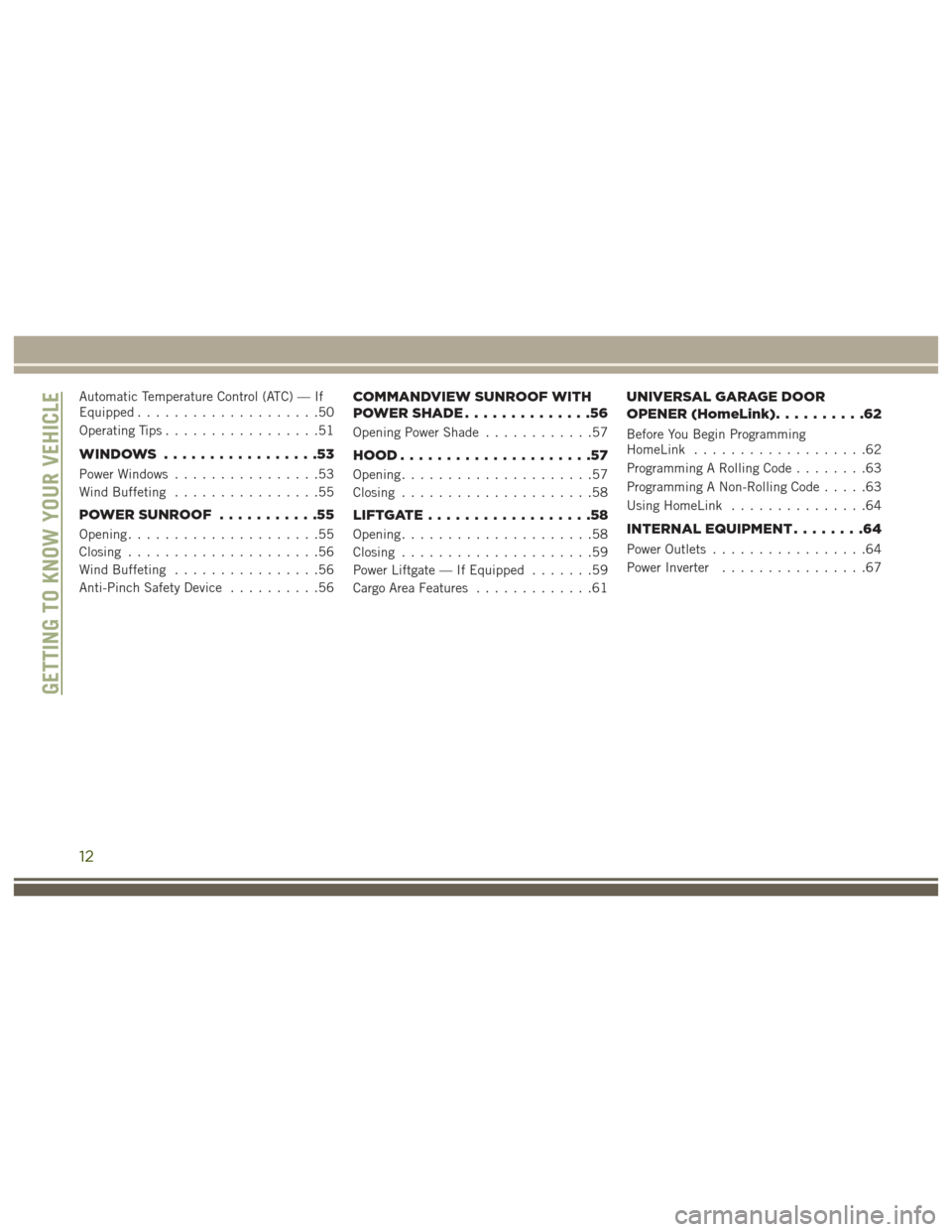
Automatic Temperature Control (ATC) — If
Equipped....................50
Operating Tips .................51
WINDOWS .................53
Power Windows ................53
Wind Buffeting ................55
POWER SUNROOF ...........55
Opening.....................55
Closing .....................56
Wind Buffeting ................56
Anti-Pinch Safety Device ..........56
COMMANDVIEW SUNROOF WITH
POWER SHADE..............56
Opening Power Shade ............57
HOOD.....................57
Opening .....................57
Closing .....................58
LIFTGATE ..................58
Opening.....................58
Closing .....................59
Power Liftgate — If Equipped .......59
Cargo Area Features .............61
UNIVERSAL GARAGE DOOR
OPENER (HomeLink) ..........62
Before You Begin Programming
HomeLink...................62
Programming A Rolling Code ........63
Programming A Non-Rolling Code .....63
Using HomeLink ...............64
INTERNAL EQUIPMENT ........64
Power Outlets.................64
Power Inverter ................67
GETTING TO KNOW YOUR VEHICLE
12
Page 17 of 372
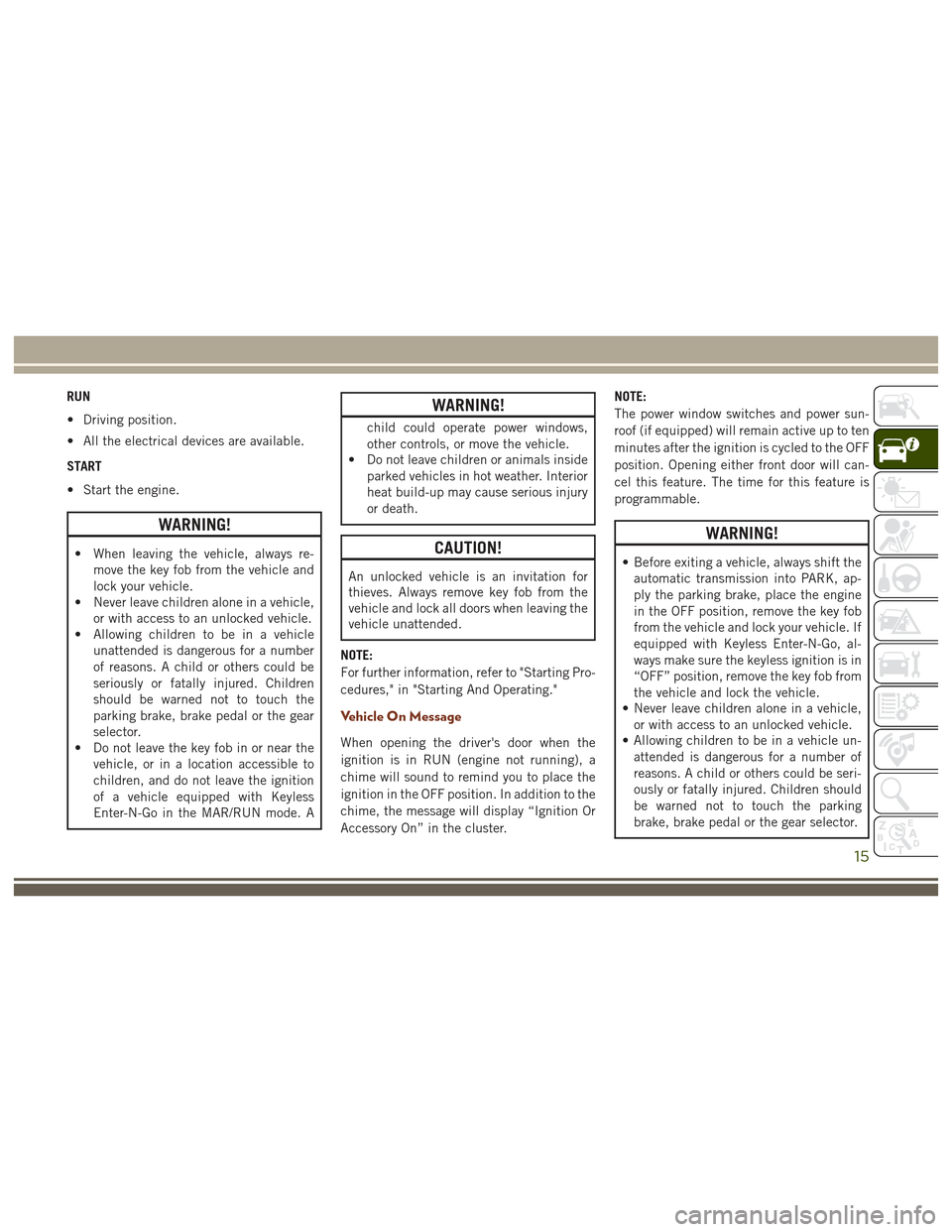
RUN
• Driving position.
• All the electrical devices are available.
START
• Start the engine.
WARNING!
• When leaving the vehicle, always re-move the key fob from the vehicle and
lock your vehicle.
• Never leave children alone in a vehicle,
or with access to an unlocked vehicle.
• Allowing children to be in a vehicle
unattended is dangerous for a number
of reasons. A child or others could be
seriously or fatally injured. Children
should be warned not to touch the
parking brake, brake pedal or the gear
selector.
• Do not leave the key fob in or near the
vehicle, or in a location accessible to
children, and do not leave the ignition
of a vehicle equipped with Keyless
Enter-N-Go in the MAR/RUN mode. A
WARNING!
child could operate power windows,
other controls, or move the vehicle.
• Do not leave children or animals inside
parked vehicles in hot weather. Interior
heat build-up may cause serious injury
or death.
CAUTION!
An unlocked vehicle is an invitation for
thieves. Always remove key fob from the
vehicle and lock all doors when leaving the
vehicle unattended.
NOTE:
For further information, refer to "Starting Pro-
cedures," in "Starting And Operating."
Vehicle On Message
When opening the driver's door when the
ignition is in RUN (engine not running), a
chime will sound to remind you to place the
ignition in the OFF position. In addition to the
chime, the message will display “Ignition Or
Accessory On” in the cluster. NOTE:
The power window switches and power sun-
roof (if equipped) will remain active up to ten
minutes after the ignition is cycled to the OFF
position. Opening either front door will can-
cel this feature. The time for this feature is
programmable.
WARNING!
• Before exiting a vehicle, always shift the
automatic transmission into PARK, ap-
ply the parking brake, place the engine
in the OFF position, remove the key fob
from the vehicle and lock your vehicle. If
equipped with Keyless Enter-N-Go, al-
ways make sure the keyless ignition is in
“OFF” position, remove the key fob from
the vehicle and lock the vehicle.
• Never leave children alone in a vehicle,
or with access to an unlocked vehicle.
• Allowing children to be in a vehicle un-
attended is dangerous for a number of
reasons. A child or others could be seri-
ously or fatally injured. Children should
be warned not to touch the parking
brake, brake pedal or the gear selector.
15
Page 18 of 372
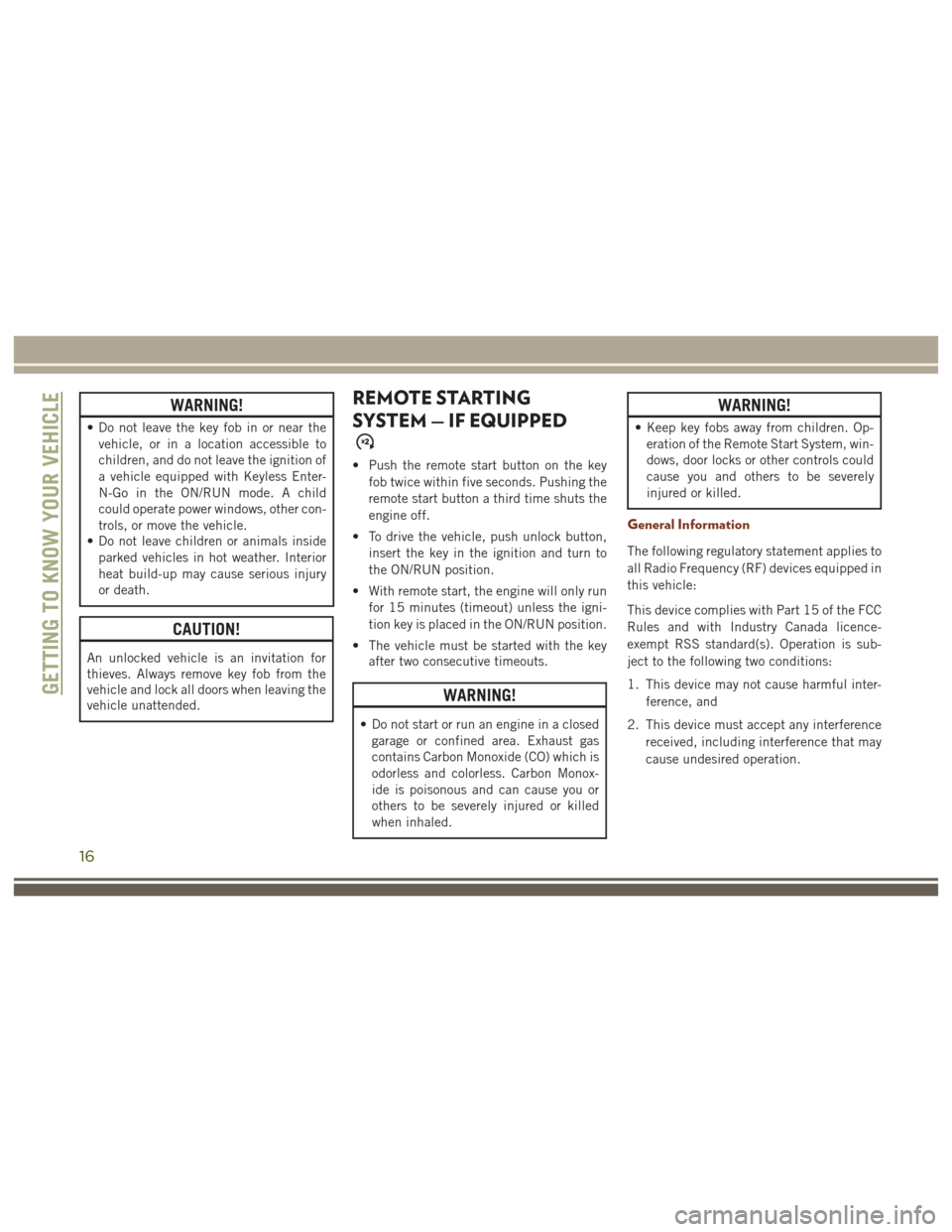
WARNING!
• Do not leave the key fob in or near thevehicle, or in a location accessible to
children, and do not leave the ignition of
a vehicle equipped with Keyless Enter-
N-Go in the ON/RUN mode. A child
could operate power windows, other con-
trols, or move the vehicle.
• Do not leave children or animals inside
parked vehicles in hot weather. Interior
heat build-up may cause serious injury
or death.
CAUTION!
An unlocked vehicle is an invitation for
thieves. Always remove key fob from the
vehicle and lock all doors when leaving the
vehicle unattended.
REMOTE STARTING
SYSTEM — IF EQUIPPED
• Push the remote start button on the key
fob twice within five seconds. Pushing the
remote start button a third time shuts the
engine off.
• To drive the vehicle, push unlock button, insert the key in the ignition and turn to
the ON/RUN position.
• With remote start, the engine will only run for 15 minutes (timeout) unless the igni-
tion key is placed in the ON/RUN position.
• The vehicle must be started with the key after two consecutive timeouts.
WARNING!
• Do not start or run an engine in a closed
garage or confined area. Exhaust gas
contains Carbon Monoxide (CO) which is
odorless and colorless. Carbon Monox-
ide is poisonous and can cause you or
others to be severely injured or killed
when inhaled.
WARNING!
• Keep key fobs away from children. Op-eration of the Remote Start System, win-
dows, door locks or other controls could
cause you and others to be severely
injured or killed.
General Information
The following regulatory statement applies to
all Radio Frequency (RF) devices equipped in
this vehicle:
This device complies with Part 15 of the FCC
Rules and with Industry Canada licence-
exempt RSS standard(s). Operation is sub-
ject to the following two conditions:
1. This device may not cause harmful inter-
ference, and
2. This device must accept any interference received, including interference that may
cause undesired operation.
GETTING TO KNOW YOUR VEHICLE
16
Page 36 of 372
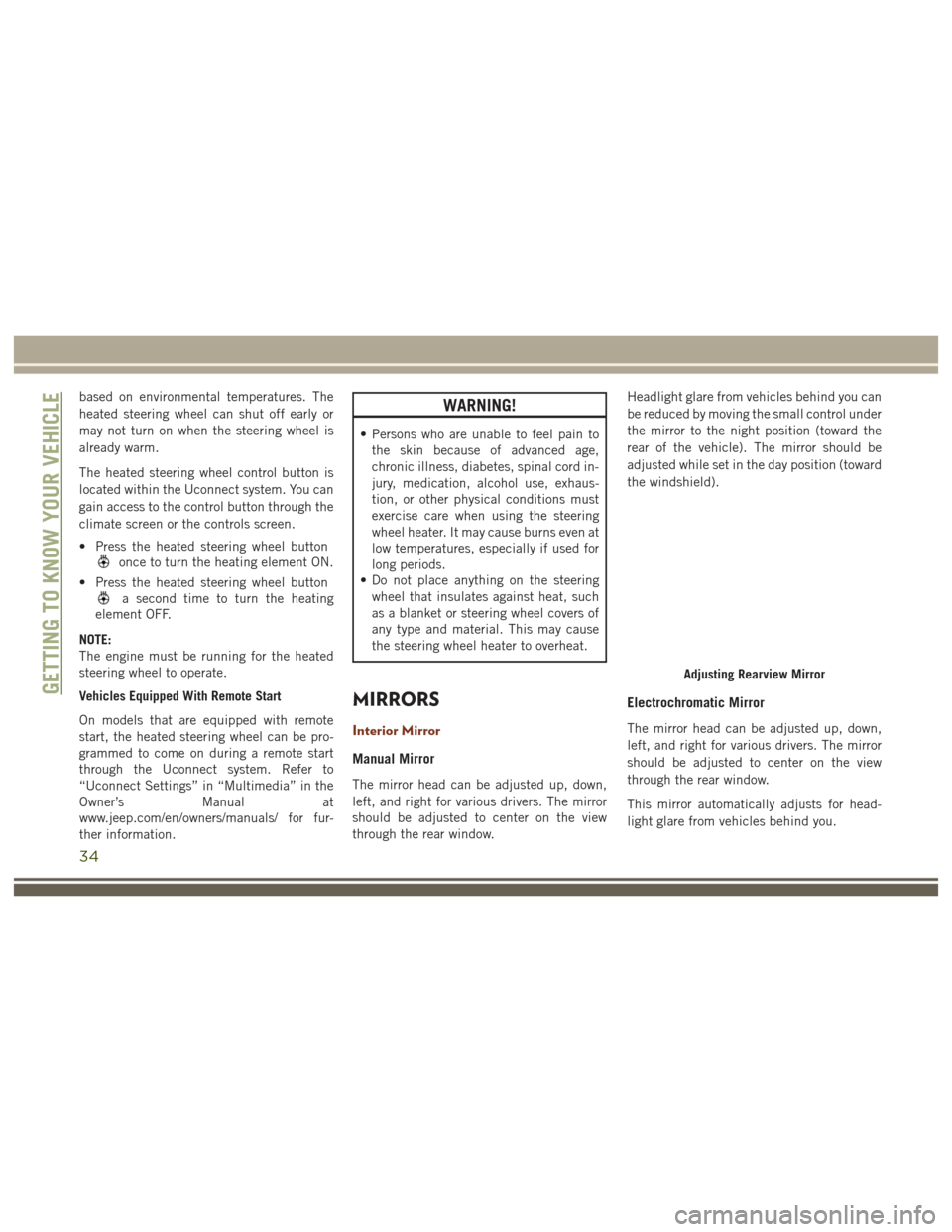
based on environmental temperatures. The
heated steering wheel can shut off early or
may not turn on when the steering wheel is
already warm.
The heated steering wheel control button is
located within the Uconnect system. You can
gain access to the control button through the
climate screen or the controls screen.
• Press the heated steering wheel button
once to turn the heating element ON.
• Press the heated steering wheel button
a second time to turn the heating
element OFF.
NOTE:
The engine must be running for the heated
steering wheel to operate.
Vehicles Equipped With Remote Start
On models that are equipped with remote
start, the heated steering wheel can be pro-
grammed to come on during a remote start
through the Uconnect system. Refer to
“Uconnect Settings” in “Multimedia” in the
Owner’s Manualat
www.jeep.com/en/owners/manuals/ for fur-
ther information.
WARNING!
• Persons who are unable to feel pain to the skin because of advanced age,
chronic illness, diabetes, spinal cord in-
jury, medication, alcohol use, exhaus-
tion, or other physical conditions must
exercise care when using the steering
wheel heater. It may cause burns even at
low temperatures, especially if used for
long periods.
• Do not place anything on the steering
wheel that insulates against heat, such
as a blanket or steering wheel covers of
any type and material. This may cause
the steering wheel heater to overheat.
MIRRORS
Interior Mirror
Manual Mirror
The mirror head can be adjusted up, down,
left, and right for various drivers. The mirror
should be adjusted to center on the view
through the rear window. Headlight glare from vehicles behind you can
be reduced by moving the small control under
the mirror to the night position (toward the
rear of the vehicle). The mirror should be
adjusted while set in the day position (toward
the windshield).
Electrochromatic Mirror
The mirror head can be adjusted up, down,
left, and right for various drivers. The mirror
should be adjusted to center on the view
through the rear window.
This mirror automatically adjusts for head-
light glare from vehicles behind you.
Adjusting Rearview Mirror
GETTING TO KNOW YOUR VEHICLE
34
Page 38 of 372
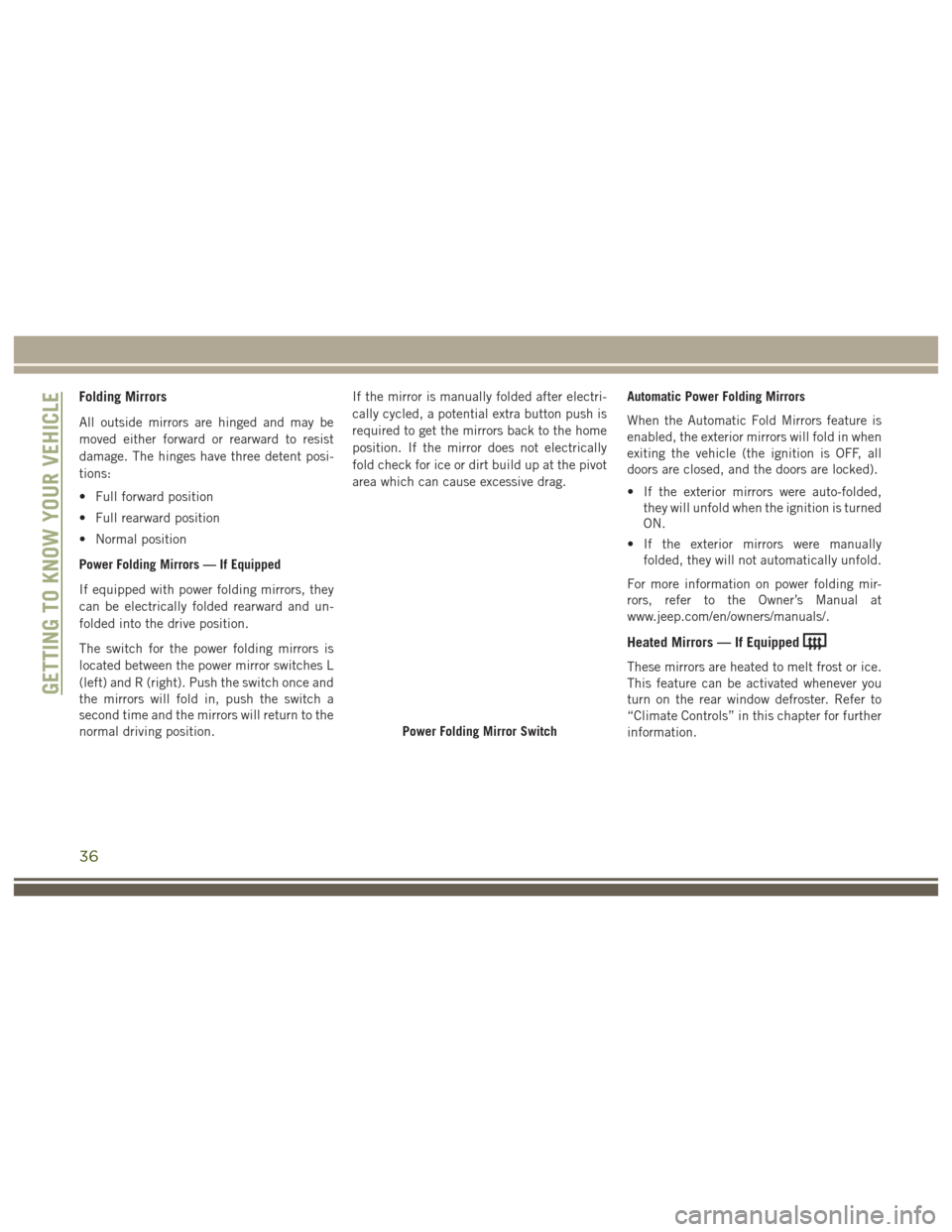
Folding Mirrors
All outside mirrors are hinged and may be
moved either forward or rearward to resist
damage. The hinges have three detent posi-
tions:
• Full forward position
• Full rearward position
• Normal position
Power Folding Mirrors — If Equipped
If equipped with power folding mirrors, they
can be electrically folded rearward and un-
folded into the drive position.
The switch for the power folding mirrors is
located between the power mirror switches L
(left) and R (right). Push the switch once and
the mirrors will fold in, push the switch a
second time and the mirrors will return to the
normal driving position.If the mirror is manually folded after electri-
cally cycled, a potential extra button push is
required to get the mirrors back to the home
position. If the mirror does not electrically
fold check for ice or dirt build up at the pivot
area which can cause excessive drag.
Automatic Power Folding Mirrors
When the Automatic Fold Mirrors feature is
enabled, the exterior mirrors will fold in when
exiting the vehicle (the ignition is OFF, all
doors are closed, and the doors are locked).
• If the exterior mirrors were auto-folded,
they will unfold when the ignition is turned
ON.
• If the exterior mirrors were manually folded, they will not automatically unfold.
For more information on power folding mir-
rors, refer to the Owner’s Manual at
www.jeep.com/en/owners/manuals/.
Heated Mirrors — If Equipped
These mirrors are heated to melt frost or ice.
This feature can be activated whenever you
turn on the rear window defroster. Refer to
“Climate Controls” in this chapter for further
information.
Power Folding Mirror Switch
GETTING TO KNOW YOUR VEHICLE
36
Page 48 of 372
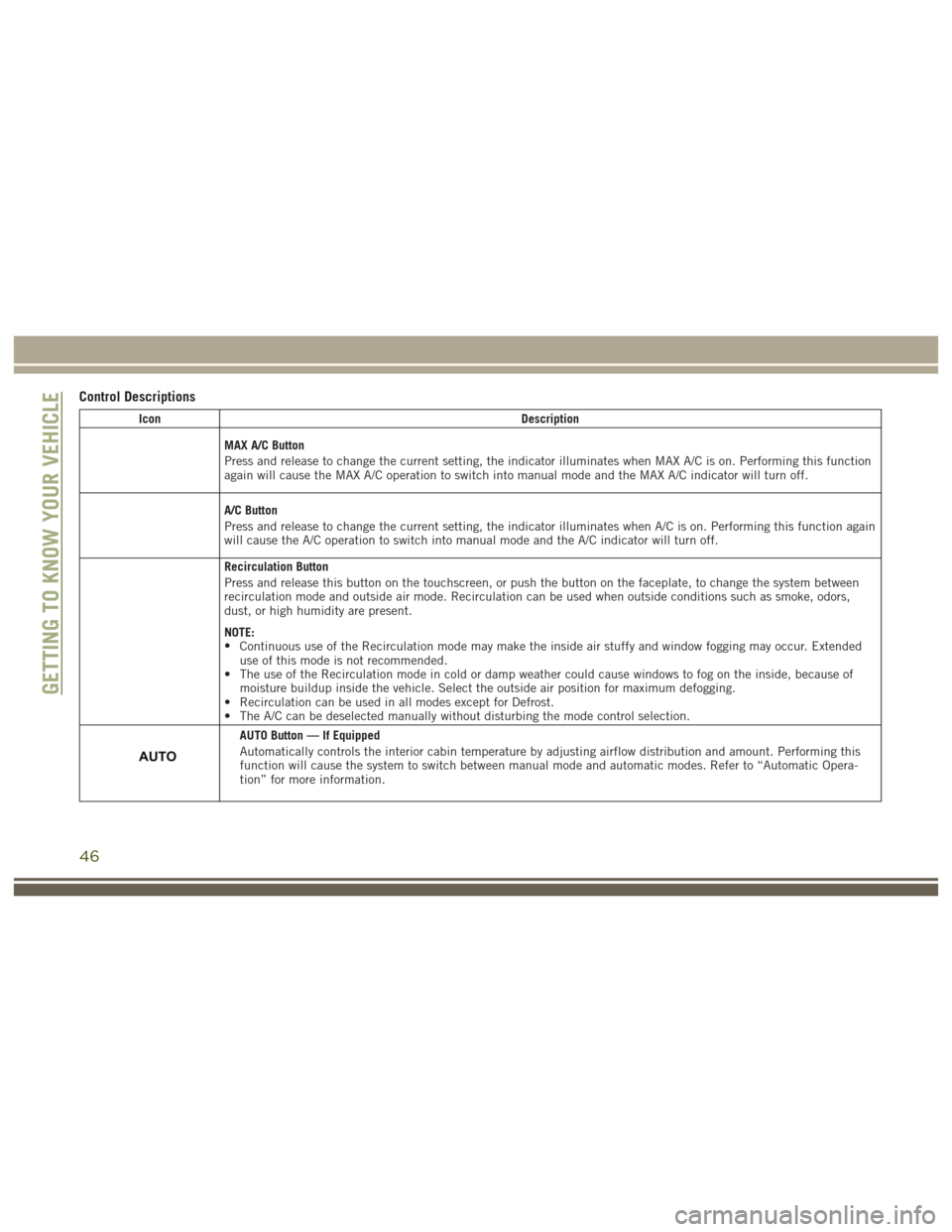
Control Descriptions
IconDescription
MAX A/C Button
Press and release to change the current setting, the indicator illuminates when MAX A/C is on. Performing this function
again will cause the MAX A/C operation to switch into manual mode and the MAX A/C indicator will turn off.
A/C Button
Press and release to change the current setting, the indicator illuminates when A/C is on. Performing this function again
will cause the A/C operation to switch into manual mode and the A/C indicator will turn off.
Recirculation Button
Press and release this button on the touchscreen, or push the button on the faceplate, to change the system between
recirculation mode and outside air mode. Recirculation can be used when outside conditions such as smoke, odors,
dust, or high humidity are present.
NOTE:
•
Continuous use of the Recirculation mode may make the inside air stuffy and window fogging may occur. Extended
use of this mode is not recommended.
• The use of the Recirculation mode in cold or damp weather could cause windows to fog on the inside, because of moisture buildup inside the vehicle. Select the outside air position for maximum defogging.
• Recirculation can be used in all modes except for Defrost.
• The A/C can be deselected manually without disturbing the mode control selection.
AUTO Button — If Equipped
Automatically controls the interior cabin temperature by adjusting airflow distribution and amount. Performing this
function will cause the system to switch between manual mode and automatic modes. Refer to “Automatic Opera-
tion” for more information.
GETTING TO KNOW YOUR VEHICLE
46
Page 49 of 372
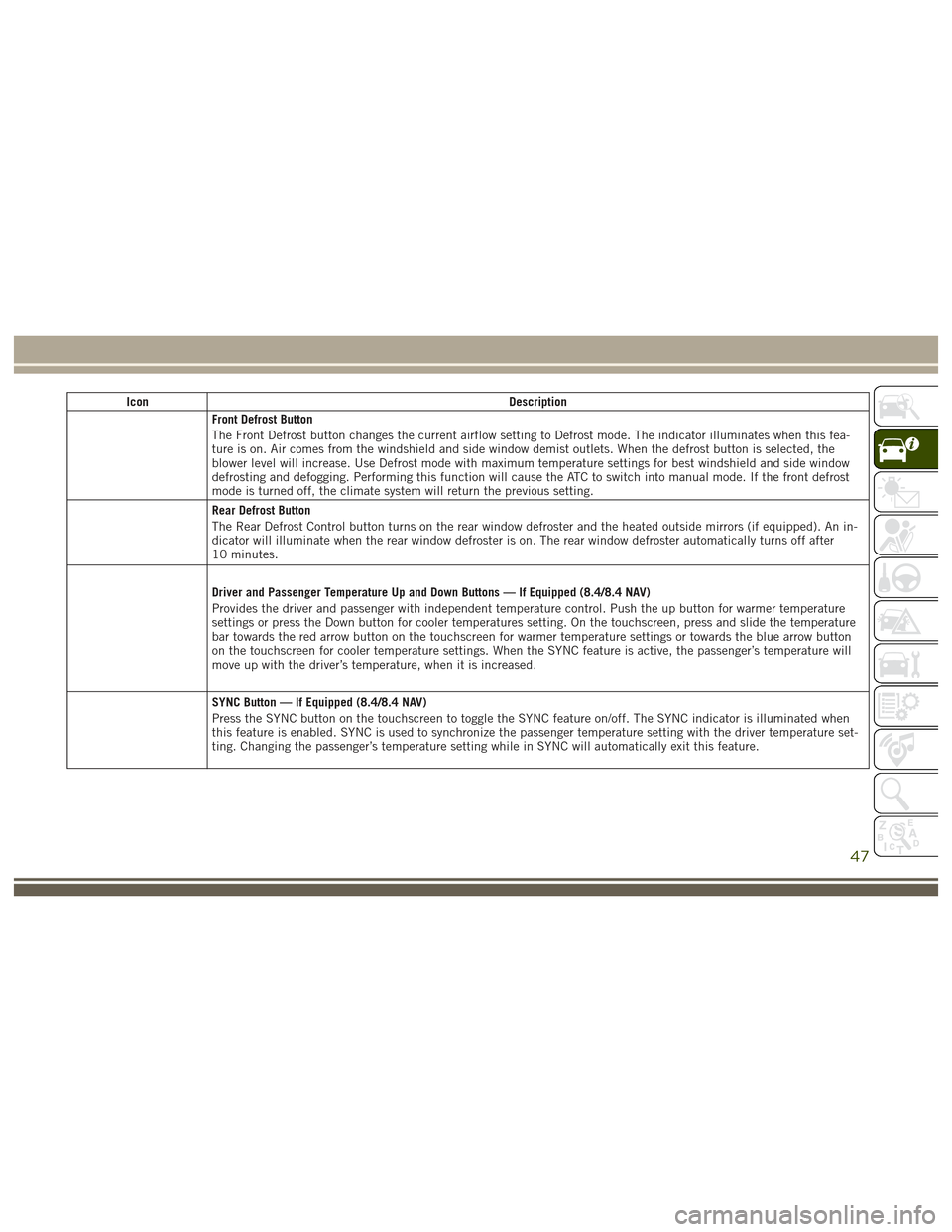
IconDescription
Front Defrost Button
The Front Defrost button changes the current airflow setting to Defrost mode. The indicator illuminates when this fea-
ture is on. Air comes from the windshield and side window demist outlets. When the defrost button is selected, the
blower level will increase. Use Defrost mode with maximum temperature settings for best windshield and side window
defrosting and defogging. Performing this function will cause the ATC to switch into manual mode. If the front defrost
mode is turned off, the climate system will return the previous setting.
Rear Defrost Button
The Rear Defrost Control button turns on the rear window defroster and the heated outside mirrors (if equipped). An in-
dicator will illuminate when the rear window defroster is on. The rear window defroster automatically turns off after
10 minutes.
Driver and Passenger Temperature Up and Down Buttons — If Equipped (8.4/8.4 NAV)
Provides the driver and passenger with independent temperature control. Push the up button for warmer temperature
settings or press the Down button for cooler temperatures setting. On the touchscreen, press and slide the temperature
bar towards the red arrow button on the touchscreen for warmer temperature settings or towards the blue arrow button
on the touchscreen for cooler temperature settings. When the SYNC feature is active, the passenger’s temperature will
move up with the driver’s temperature, when it is increased.
SYNC Button — If Equipped (8.4/8.4 NAV)
Press the SYNC button on the touchscreen to toggle the SYNC feature on/off. The SYNC indicator is illuminated when
this feature is enabled. SYNC is used to synchronize the passenger temperature setting with the driver temperature set-
ting. Changing the passenger’s temperature setting while in SYNC will automatically exit this feature.
47
Page 50 of 372
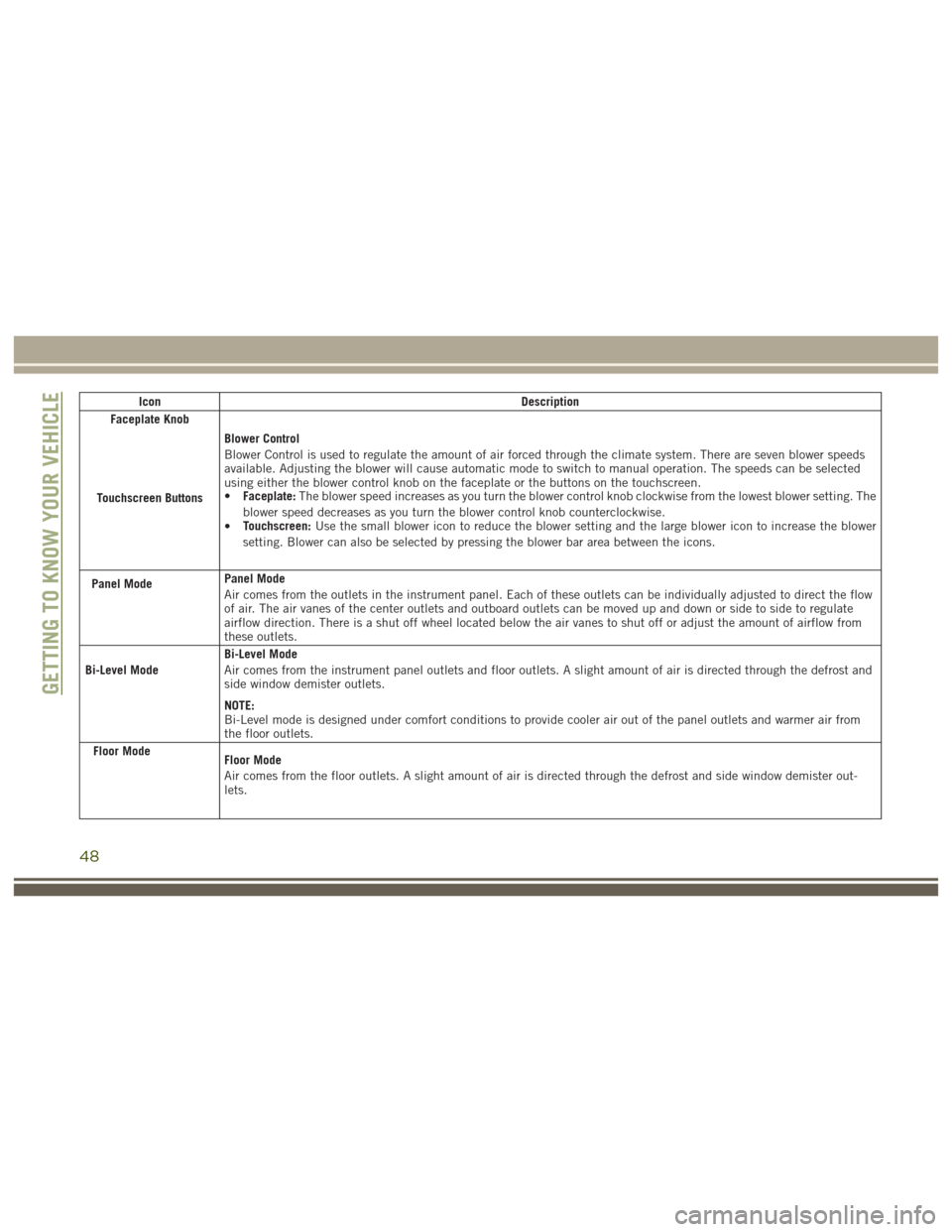
IconDescription
Faceplate Knob
Touchscreen Buttons
Blower Control
Blower Control is used to regulate the amount of air forced through the climate system. There are seven blower speeds
available. Adjusting the blower will cause automatic mode to switch to manual operation. The speeds can be selected
using either the blower control knob on the faceplate or the buttons on the touchscreen.
• Faceplate: The blower speed increases as you turn the blower control knob clockwise from the lowest blower setting. The
blower speed decreases as you turn the blower control knob counterclockwise.
• Touchscreen:
Use the small blower icon to reduce the blower setting and the large blower icon to increase the blower
setting. Blower can also be selected by pressing the blower bar area between the icons.
Panel Mode
Panel Mode
Air comes from the outlets in the instrument panel. Each of these outlets can be individually adjusted to direct the flow
of air. The air vanes of the center outlets and outboard outlets can be moved up and down or side to side to regulate
airflow direction. There is a shut off wheel located below the air vanes to shut off or adjust the amount of airflow from
these outlets.
Bi-Level Mode
Bi-Level Mode
Air comes from the instrument panel outlets and floor outlets. A slight amount of air is directed through the defrost and
side window demister outlets.
NOTE:
Bi-Level mode is designed under comfort conditions to provide cooler air out of the panel outlets and warmer air from
the floor outlets.
Floor Mode
Floor Mode
Air comes from the floor outlets. A slight amount of air is directed through the defrost and side window demister out-
lets.
GETTING TO KNOW YOUR VEHICLE
48
Page 51 of 372
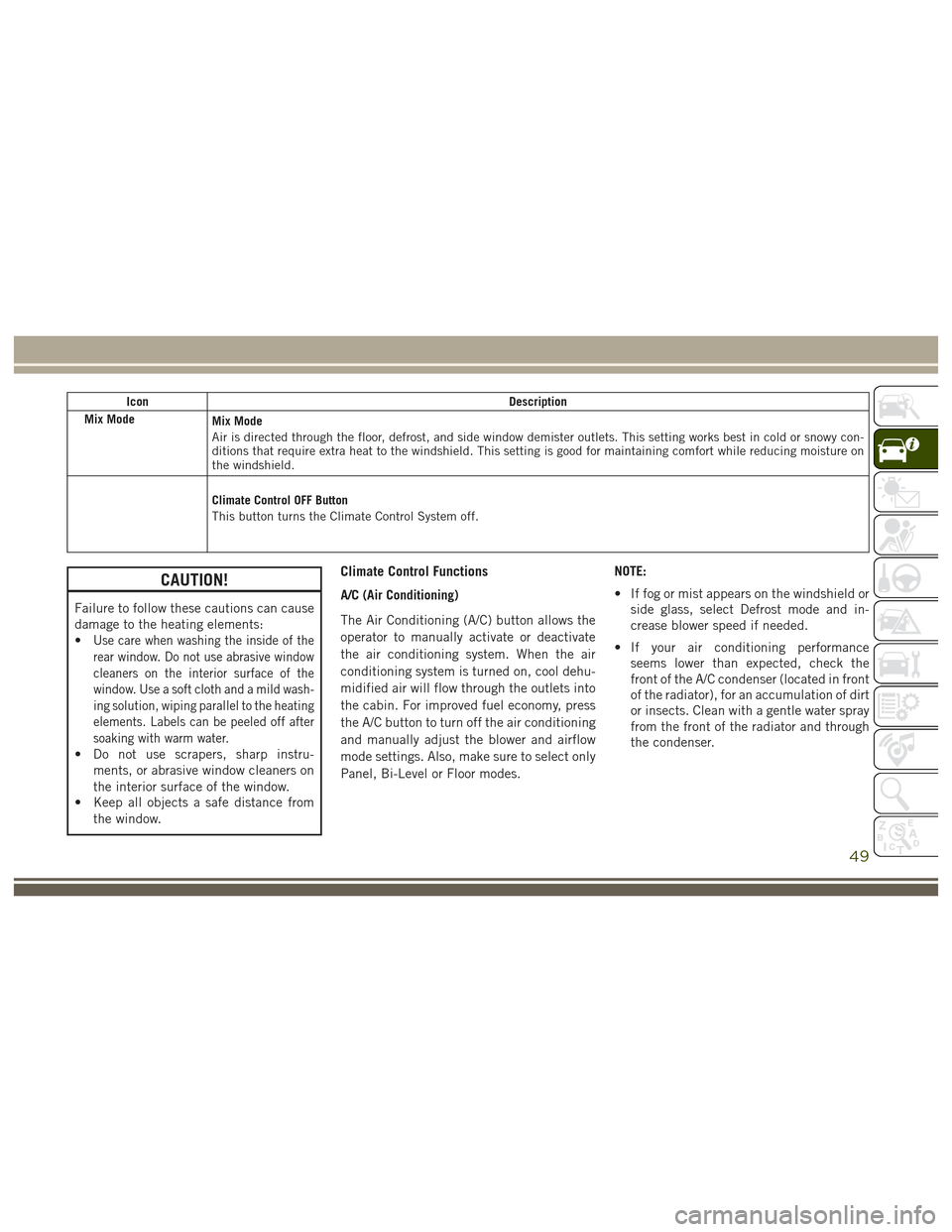
IconDescription
Mix Mode
Mix Mode
Air is directed through the floor, defrost, and side window demister outlets. This setting works best in cold or snowy con-
ditions that require extra heat to the windshield. This setting is good for maintaining comfort while reducing moisture on
the windshield.
Climate Control OFF Button
This button turns the Climate Control System off.
CAUTION!
Failure to follow these cautions can cause
damage to the heating elements:
•
Usecarewhenwashingtheinsideofthe
rear window. Do not use abrasive window
cleaners on the interior surface of the
window. Use a soft cloth and a mild wash-
ing solution, wiping parallel to the heating
elements. Labels can be peeled off after
soaking with warm water.
• Do not use scrapers, sharp instru- ments, or abrasive window cleaners on
the interior surface of the window.
• Keep all objects a safe distance from
the window.
Climate Control Functions
A/C (Air Conditioning)
The Air Conditioning (A/C) button allows the
operator to manually activate or deactivate
the air conditioning system. When the air
conditioning system is turned on, cool dehu-
midified air will flow through the outlets into
the cabin. For improved fuel economy, press
the A/C button to turn off the air conditioning
and manually adjust the blower and airflow
mode settings. Also, make sure to select only
Panel, Bi-Level or Floor modes. NOTE:
• If fog or mist appears on the windshield or
side glass, select Defrost mode and in-
crease blower speed if needed.
• If your air conditioning performance seems lower than expected, check the
front of the A/C condenser (located in front
of the radiator), for an accumulation of dirt
or insects. Clean with a gentle water spray
from the front of the radiator and through
the condenser.
49